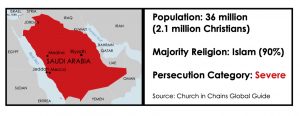
The Kingdom of Saudi Arabia holds vast oil reserves and is the birthplace of Islam and home to its two holiest sites, Mecca and Medina. However, it also has one of the worst human rights records, severely restricting the right to freedom of expression and the rights of women. Religious freedom does not exist in Saudi Arabia and no church buildings are permitted. All Saudi citizens are considered to be Muslims (most hold to Wahhabism, a strict form of Sunni Islam) and apostasy is a capital offence. While no Christian convert is known to have been executed in recent times, some have been murdered by their families.
Almost 4,000 religious police officers (mutawaah) patrol the streets to enforce strict Sharia law and punishments include amputations, floggings and long imprisonment.
In 2017 Crown Prince Mohammed Bin Salman announced that Saudi Arabia would follow a more moderate form of Islam rather than the strict Wahhabism to which the monarchy had subscribed and some reforms have been introduced, including improvements to women’s rights.
Christians in Saudi Arabia
Most Christians in Saudi Arabia are expatriates, mainly migrant workers from Africa and Asia. They face severe restrictions on meeting together, and many have been deported, but in recent years there has been less public enforcement by religious police and some congregations can hold large services discreetly. Expatriates can celebrate Christmas by decorating their homes and holding gatherings in their compounds.
It is illegal to evangelise Muslims but there is a growing number of secret Saudi Christian converts. They face severe persecution if discovered, including beatings by family or the authorities, and they often have to leave their homes and sometimes the country.
In recent years Saudi Arabia has hosted several Coptic Orthodox masses around Christmas, following an invitation from Crown Prince Mohammed bin Salman. Egypt and Saudi Arabia have a close economic relationship and Bishop Anba Markos, Metropolitan of Shoubra al-Kheima in Cairo, has made several pastoral visits to Saudi Arabia.
(Aleteia, BBC News, Church in Chains Global Guide, International Christian Concern, Middle East Concern, Open Doors World Watch List, Premier Christian Radio)
